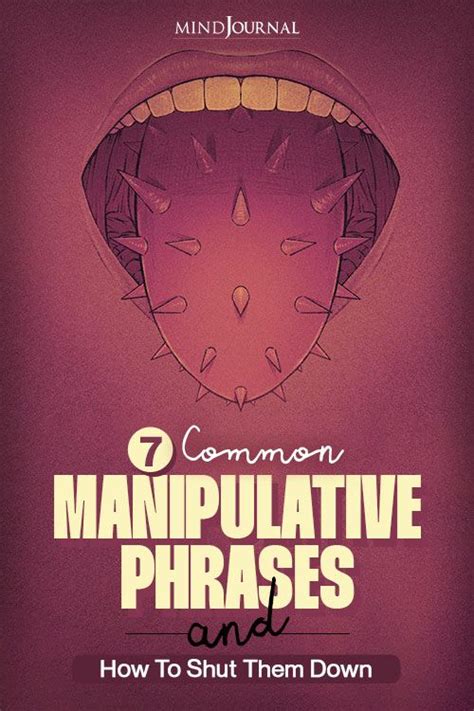
Navigating interpersonal dynamics can be challenging, particularly when encountering manipulative individuals. Recognizing specific phrases commonly used by manipulators can be a crucial first step in protecting oneself from emotional and psychological harm. Experts have identified several defensive phrases that should raise red flags in conversations and relationships.
Manipulative people often employ specific language tactics to deflect blame, control narratives, and undermine others’ confidence. According to insights provided by psychologists and relationship experts, awareness of these phrases can empower individuals to recognize and counteract manipulative behaviors. The following thirteen phrases are commonly used by manipulators, signaling the need for caution and strategic communication:
1. “You’re too sensitive.”
This phrase is a classic deflection tactic used to invalidate someone’s feelings. By suggesting that the individual is overly sensitive, the manipulator avoids taking responsibility for their actions or words. “This minimizes the impact of their behavior and shifts the blame onto the other person,” explains a relationship expert. It’s a form of gaslighting, making the person question their perception of reality.
2. “I was just joking!”
This phrase is often used after making a hurtful or offensive remark. The manipulator attempts to dismiss the impact of their words by claiming it was merely a joke, thereby avoiding accountability. “It’s a way to test boundaries and see what they can get away with,” says Dr. Lillian Glass, a communication and body language expert. If the “joke” consistently targets vulnerabilities or makes someone uncomfortable, it’s likely a manipulative tactic.
3. “You always/never…”
These absolute statements are rarely accurate and are used to exaggerate flaws and create a sense of guilt. They are a form of overgeneralization, designed to make the individual feel inadequate and defensive. “Manipulators use ‘always’ or ‘never’ to paint a broad, negative picture of someone’s behavior, making it difficult for them to defend themselves,” notes a clinical psychologist. Such statements lack nuance and are intended to provoke an emotional reaction.
4. “Why are you getting so defensive?”
This question is designed to shift the focus from the manipulator’s behavior to the other person’s reaction. By questioning their defensiveness, the manipulator implies that they are the problem, not the manipulator. “It’s a classic way to turn the tables and make the other person feel like they’re overreacting or being unreasonable,” explains a family therapist. It avoids addressing the initial issue that prompted the defensive response.
5. “I’m sorry you feel that way.”
This is a non-apology. The manipulator acknowledges the other person’s feelings without taking responsibility for their role in causing those feelings. The focus remains on the other person’s emotional state rather than the manipulator’s actions. “It’s a way to offer a superficial apology without actually admitting any wrongdoing,” says a communication expert. It can leave the injured party feeling dismissed and unheard.
6. “You’re overreacting.”
Similar to “You’re too sensitive,” this phrase invalidates the other person’s feelings and experiences. It suggests that their emotional response is disproportionate to the situation, minimizing their concerns. “By labeling someone as ‘overreacting,’ the manipulator attempts to control the narrative and diminish the validity of their emotions,” explains a licensed therapist. This undermines the person’s ability to trust their own judgment.
7. “I do so much for you.”
This statement is used to create a sense of obligation and guilt. The manipulator reminds the other person of all the things they have done, implying that they are entitled to special treatment or compliance. “It’s a way of keeping score and holding those ‘favors’ over the other person’s head,” says a relationship coach. It manipulates the individual into feeling indebted and less likely to assert their own needs.
8. “If you really loved me, you would…”
This is a blatant attempt to use emotional blackmail. The manipulator links their love or approval to a specific behavior, creating pressure and guilt. It implies that love is conditional and dependent on fulfilling their demands. “This phrase is a direct manipulation tactic that preys on someone’s desire for love and acceptance,” explains a clinical psychologist. It undermines the foundation of healthy relationships built on unconditional love and respect.
9. “I’m the only one who will be honest with you.”
This isolating tactic is used to undermine the other person’s relationships with friends and family. The manipulator positions themselves as the sole source of truth, creating dependence and isolating the individual from other sources of support. “By suggesting that everyone else is being dishonest, the manipulator aims to create a sense of reliance and control,” notes a social worker. This can lead to increased vulnerability and susceptibility to manipulation.
10. “You’re twisting my words.”
This phrase is a form of gaslighting that denies the manipulator’s original statement and accuses the other person of misinterpreting them. It is a way to avoid accountability for their words and actions. “Manipulators use this phrase to deflect blame and make the other person question their understanding of the situation,” explains a communication expert. This can erode trust and make it difficult to have honest conversations.
11. “I didn’t mean it like that.”
Similar to “I was just joking,” this phrase attempts to minimize the impact of hurtful words by claiming a different intention. The manipulator avoids taking responsibility for the actual effect of their words. “It’s a way to backtrack and avoid accountability, even when their intentions were clearly harmful or malicious,” says a relationship therapist. It dismisses the validity of the other person’s emotional response.
12. “You’re imagining things.”
This is a blatant form of gaslighting that attempts to make the other person question their perception of reality. The manipulator denies their experiences or observations, creating confusion and self-doubt. “By telling someone they’re ‘imagining things,’ the manipulator seeks to undermine their confidence and control their perception of reality,” explains a psychologist specializing in gaslighting. This can have serious consequences for the person’s mental health and self-esteem.
13. Silence or Stonewalling
While not a phrase, strategic silence or stonewalling is a powerful manipulative tactic. By refusing to engage in communication, the manipulator withholds affection, attention, or information as a form of punishment or control. This can create anxiety and frustration in the other person, who may try to appease the manipulator to break the silence. “Silence can be a potent weapon, used to exert power and control in a relationship,” says a family therapist. It avoids addressing issues directly and forces the other person to bear the burden of the conflict.
Understanding Manipulative Behavior
Manipulation is a complex behavior pattern characterized by attempts to exploit, control, or influence others for personal gain. It often involves subtle tactics that erode a person’s self-esteem and autonomy over time. Recognizing these phrases is not about diagnosing others but about becoming more aware of potentially harmful interactions.
Why Do People Manipulate?
People manipulate for various reasons, often stemming from deep-seated insecurities, a need for control, or a lack of empathy. Some may have learned manipulative behaviors in their families of origin, while others may use manipulation as a coping mechanism to protect themselves from perceived threats or vulnerabilities. “Understanding the underlying motivations behind manipulative behavior can help us approach these interactions with more clarity and resilience,” explains a social worker.
Defensive Strategies Against Manipulation
Recognizing these phrases is only the first step. Developing effective defensive strategies is crucial for protecting oneself from manipulation. Some strategies include:
- Setting Boundaries: Clearly define your limits and communicate them assertively.
- Trusting Your Intuition: Pay attention to your gut feelings and don’t dismiss your intuition, even if the manipulator tries to invalidate it.
- Seeking External Validation: Talk to trusted friends, family members, or therapists to get an outside perspective and validate your experiences.
- Documenting Interactions: Keeping a record of manipulative behaviors can help you stay grounded and avoid self-doubt.
- Detaching Emotionally: Practice detaching from the manipulator’s emotional demands and focusing on your own needs and well-being.
- Assertive Communication: Learn to express your needs and opinions assertively, without being aggressive or passive.
- Limiting Contact: In some cases, it may be necessary to limit or end contact with the manipulative person to protect your mental health.
- Self-Care: Prioritize self-care activities that promote your emotional and physical well-being.
The Impact of Manipulation
Being subjected to manipulation can have significant negative impacts on mental health and well-being. It can lead to:
- Low Self-Esteem: Constant criticism and invalidation can erode self-confidence and self-worth.
- Anxiety and Depression: Manipulative behaviors can create chronic stress and contribute to anxiety and depression.
- Difficulty Trusting Others: Being betrayed by a manipulator can make it difficult to trust others in the future.
- Relationship Problems: Manipulation can damage relationships and create conflict and resentment.
- Loss of Identity: Over time, manipulation can lead to a loss of identity and a sense of disconnection from oneself.
- Emotional Exhaustion: Dealing with a manipulator can be emotionally draining and lead to burnout.
- Post-Traumatic Stress Symptoms: In severe cases, manipulation can lead to symptoms of post-traumatic stress.
Case Studies and Examples
To illustrate the impact of these manipulative phrases, consider the following case studies:
-
Case Study 1: The “Sensitive” Partner
- Sarah is in a relationship with Mark, who frequently dismisses her feelings by saying, “You’re too sensitive.” Whenever Sarah expresses concerns about Mark’s behavior, such as his late nights out or his dismissive attitude, Mark immediately accuses her of being overly sensitive. This pattern has led Sarah to question her own emotions and avoid bringing up issues in the relationship, fearing that she will be labeled as “sensitive” again. Over time, Sarah’s self-esteem has diminished, and she feels increasingly isolated and unheard. She begins to doubt her own perceptions of Mark’s behavior, wondering if she is indeed “too sensitive” as he claims.
-
Case Study 2: The “Joking” Colleague
- David works in an office with Lisa, who often makes sarcastic and offensive remarks disguised as jokes. Whenever David expresses discomfort or offense, Lisa responds with, “I was just joking!” For example, Lisa might make a comment about David’s appearance or his work performance, and when David objects, she quickly dismisses it as a joke. This behavior has created a hostile work environment for David, who feels constantly undermined and disrespected. He avoids interacting with Lisa as much as possible, but her presence continues to create stress and anxiety. David finds himself questioning whether he is overreacting to Lisa’s “jokes,” but he cannot shake the feeling that her remarks are intentionally hurtful.
-
Case Study 3: The “Always/Never” Parent
- Emily grew up with a mother who frequently used absolute statements such as “You always mess things up” or “You never listen to me.” These statements were often made in response to minor mistakes or disagreements, and they had a profound impact on Emily’s self-esteem. Emily internalized these negative messages and began to believe that she was inherently flawed and incapable. Even as an adult, Emily struggles with feelings of inadequacy and self-doubt, and she often avoids taking risks or pursuing her goals, fearing that she will inevitably fail. She constantly seeks validation from others, trying to compensate for the lack of positive reinforcement she received during her childhood.
-
Case Study 4: The Silent Treatment
- John and his wife, Mary, often argue. Whenever Mary feels hurt or angry, she resorts to stonewalling. She refuses to speak to John for days, sometimes even weeks. This silent treatment creates a tense and uncomfortable atmosphere in their home. John feels helpless and frustrated, unsure of how to break through Mary’s silence. He tries to apologize, even when he’s not sure what he did wrong, just to restore peace. Over time, John has learned to avoid conflict with Mary at all costs, fearing another episode of stonewalling. He walks on eggshells around her, suppressing his own feelings and needs to avoid upsetting her. This dynamic has created a significant power imbalance in their relationship, with Mary wielding control through her silence.
These case studies highlight the different ways in which manipulative phrases and tactics can impact individuals and relationships. By recognizing these patterns, individuals can take steps to protect themselves and seek support when needed.
When to Seek Professional Help
If you are in a relationship with someone who consistently uses manipulative tactics, it may be beneficial to seek professional help. A therapist or counselor can provide support and guidance in navigating these challenging dynamics and developing healthy coping mechanisms. They can also help you assess the safety and viability of the relationship and make informed decisions about your future.
Conclusion
Recognizing these thirteen phrases and understanding the underlying dynamics of manipulation is a powerful tool for self-protection and empowerment. By setting boundaries, trusting your intuition, and seeking support when needed, you can navigate challenging relationships with more confidence and resilience. The goal is not to diagnose or label others but to increase your awareness and ability to protect yourself from emotional and psychological harm. Knowledge is the first line of defense against manipulation, enabling you to foster healthier and more authentic relationships.
Frequently Asked Questions (FAQ)
1. What is emotional manipulation?
Emotional manipulation is a form of social influence where someone subtly exploits, controls, or influences others for personal gain. It often involves undermining another person’s self-esteem and autonomy. It can be intentional or unintentional, but the result is that the manipulator seeks to control the other person’s emotions, thoughts, or behaviors.
2. How can I identify if I am being manipulated?
Signs of manipulation include feeling confused or doubting your perceptions (gaslighting), feeling guilty or obligated to do things you don’t want to do, feeling constantly criticized or invalidated, and noticing a pattern of the other person avoiding responsibility for their actions. You may also feel emotionally drained or anxious after interacting with the person. Trust your intuition – if something feels wrong, it probably is.
3. What are healthy ways to respond to a manipulative person?
Healthy responses include setting clear boundaries, assertive communication (expressing your needs and opinions directly and respectfully), refusing to engage in arguments or emotional blackmail, seeking external validation from trusted sources, and detaching emotionally from the manipulator’s demands. In some cases, limiting or ending contact may be necessary.
4. Is it possible for a manipulative person to change?
Yes, it is possible, but it requires genuine self-awareness, a willingness to take responsibility for their actions, and a commitment to changing their behavior. It often requires professional help, such as therapy or counseling. However, change is not guaranteed, and it’s essential to prioritize your own well-being regardless of whether the manipulator chooses to change.
5. What are the long-term effects of being in a manipulative relationship?
Long-term effects can include low self-esteem, anxiety, depression, difficulty trusting others, relationship problems, loss of identity, emotional exhaustion, and even post-traumatic stress symptoms. It’s important to seek professional help if you are experiencing these effects to process your experiences and develop healthy coping mechanisms.









